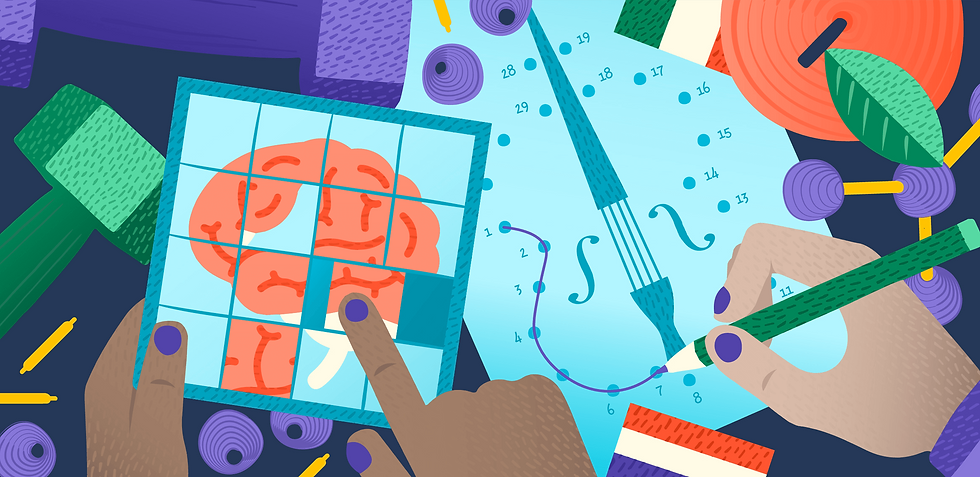Rewiring Our Minds: Unleashing Neuroplasticity
- Ananya
- Jul 21, 2023
- 3 min read

For as long as we’ve existed, human beings have been defined by our inherently profound capacity to adapt, learn, and recover incomparably to any other species: a boundless potential that we’ve been taking for granted for centuries. This ability roots from a revolutionary concept that challenges long-held, disheartening beliefs about the human brain: neuroplasticity. Neuroplasticity outlines the ability of our nervous system to rewire its responses to stimuli by reorganizing its structure, functions, or connections. The inner workings of this extraordinary phenomenon are particularly apparent after injuries like strokes or traumatic brain injuries (TBI). From trauma recovery to memory development, this capacity shapes our perception of the world and opens up thousands of doors of possibilities. This neuroscientific discovery redefines the way we approach personal growth and mental health, and it’s about time we caught on.
Much of what I’m about to talk about right now is explained in far greater depth in what I consider to be the best self-help book by far: “Mindset: the New Psychology of Success” by Carol Dweck. As an extremely science-oriented individual, the unique approach of this novel is truly captivating, and it lends incredibly objective wisdom about optimizing your mindset for success. (I do want to mention that what really did push me to write this blog was a Practice SAT Reading Passage which I can’t seem to digest considering how awfully boring most of them are)
For centuries, it has been widely accepted that the brain’s structure and function were relatively fixed after early childhood. This belief of your cognitive capacity being set in stone is often regarded as the “fixed mindset”. Personally, I’ve found this deterministic view to be extremely counterproductive and discouraging, with the implication that our intelligence, abilities, and personalities are incapable of flourishing over our lifetimes. To believe that abilities are innate and unchangeable is to claim that humans are incapable of learning and growing; an idea that is challenged by the very existence of science. As a relentlessly curious individual whose guilty pleasure is deep-sea internet diving, the pursuit of knowledge has always been my principal form of education. Thankfully, complimentary to my learning style, neuroplasticity’s emergence challenges this static outlook, resulting in a paradigm shift in our perception of the human brain.

With our brain’s no longer just being rigid machines, and rather, ever-evolving organs capable of transformation, we break free from the confines of a fixed mindset. With this renewed zeal, we can truly pursue our potential limitlessly in embrace of our new “growth mindsets”. At the heart of this neuroplasticity lies the power of learning and experience. Each new activity we encounter triggers a cascade of changes in the brain’s neural connections. As we learn, the synaptic connections between our neurons strengthen or weaken, thus resulting in a neural network that is both shaped by and shapes our abilities/behavior. Whether it’s playing an instrument or learning a foreign language, every endeavor and the frequency with which we undertake it has the potential to rewire our brain. By seeking diverse experiences and embracing a lifetime of learning, we unlock our potential for success.
Unfortunately for those who see the glass as half empty, this ‘mindset for success’ ideology implies that negative emotions like chronic stress and anxiety demote brain plasticity, diminish cognitive functions and overall-well being whilst also impairing brain function. On the other hand, positive emotions like joy and love have the opposite effect. With this knowledge, we can truly recognize the importance of prioritizing our mental and emotional well-being; they are just intrinsic to our success as hard work is. By nurturing our mental health and fostering an optimistic (or perhaps realistic) ‘growth mindset’, we can rewire our brains to thrive and succeed resiliently.
Beyond personal growth, neuroplasticity offers hope and potential avenues for recovery and rehabilitation from neurological and psychiatric disorders: strokes, traumatic brain injuries, depression, PTSD, etc. By capitalizing on the brain’s newly-understood adaptability, these treatments involve the stimulation of specific brain regions to restore lost functions or develop alternative neural pathways. In acknowledgment of our brain’s capacity of rewiring, we can transform our approach to healing and recovery.
By embracing the dynamic, changeable, and realm of possibility that neuroplasticity offers, we become the architects of our own personal transformation and empowerment rather than being bound by our limiting beliefs. We must take this as an opportunity to engage in lifelong learning, explore new horizons, and grow more compassionate towards ourselves and others: acknowledging that every individual’s experiences shape their unique neural pathways and perspectives.



Comments